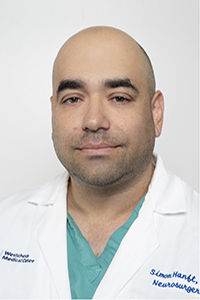Tuesday, March 28, 2023
Brain Tumor Gone, Life Back On!
When Anamaria first started experiencing recurring moments of déjà vu, she assumed these brief out-of-body experiences were the result of exhaustion caused by her busy lifestyle — after all, she was a single mother of three with a hectic work schedule. It wasn’t until a grand mal seizure landed her in MidHudson Regional Hospital’s emergency department that she received life-changing news: She had a brain tumor.
 |
| Photo courtesy of Anamaria: Hiking in Germany after receiving treatment |
“My initial reaction was complete and total shock,” Anamaria recalled. “At the time, I had no idea these minor symptoms were actually seizures. Although the diagnosis was shocking, I wasn’t scared. In fact, I had a trip planned to France two days later. I was determined to enjoy my time overseas despite my diagnosis.”
When she returned to New York, Anamaria met with a neurosurgeon to discuss treatment options for her tumor, a pleomorphic xanthoastrocytoma (PXA). PXAs are primary central nervous system tumors, which originate in the brain or spinal cord. Anamaria had a grade II PXA, or low-grade glioma, meaning the tumor cells grow slowly. However, these types of tumors are also recurrent and can be difficult, if not impossible, to remove entirely.
Due to the location of the tumor, which was seated deep in her left temporal lobe, Anamaria needed a two-part procedure. In December 2019, she underwent a craniotomy to remove as much of the tumor as possible. Although the surgeon successfully removed most of the cancerous tissue, subsequent scans showed that a small fraction — roughly 10 percent — of the original mass remained. Almost a year after the craniotomy, Simon Hanft, MD, Chief of Neurosurgical Oncology at Westchester Medical Center decided laser ablation was the best course of action.
“Laser ablation is a minimally invasive, highly accurate method of eliminating tumor tissue,” said Dr. Hanft. “The laser itself is only 3 millimeters in diameter, allowing us to penetrate the scalp and enter the skull through a very small incision. Not only does this shorten recovery time and reduce the risk of complications like infection and blood loss, but we can also access hard-to-reach regions while bypassing areas of the brain that control key functions such as vision, language and motor skills.”
Laser ablation has a high success rate, halting tumor growth in approximately 70-80 percent of cases. It also spares patients from potential neurologic injury from trying to access certain areas of the brain, and it doesn’t disrupt other treatment cycles patients may be receiving, such as chemotherapy, immunotherapy and radiation therapy.
 |
| Chief of Neurosurgical Oncology Simon Hanft, MD |
For Anamaria, the laser ablation was a breeze — she was discharged the following day without so much as a headache or other postoperative pain.
“I walked out of the hospital with a cup of coffee in my hand,” she said. “I looked like a visitor who was there to see a patient, not someone who had just undergone brain surgery. I could function and even drive right after the procedure without any repercussions.”
In the two and a half years since the ablation procedure, Anamaria has not experienced any significant tumor regrowth. She even looks forward to her annual MRI screenings and has developed close bonds with the surgeons, physicians and other members of her care team at WMCHealth.
“From my anesthesiologist to the nurses, I felt like I was being cared for by family,” said Anamaria. “For anyone experiencing a similar situation, my advice would be to put your full faith in the medical staff at WMCHealth.”
Dr. Hanft is equally pleased with Anamaria’s swift recovery and positive outcome: “For Anamaria and so many others, laser ablation is a powerful alternative or supplement to traditional interventions.”
If you’re experiencing worrying symptoms or would like to learn more about neurosurgical oncology options, make an appointment with WMCHealth’s Brain and Spine Institute.